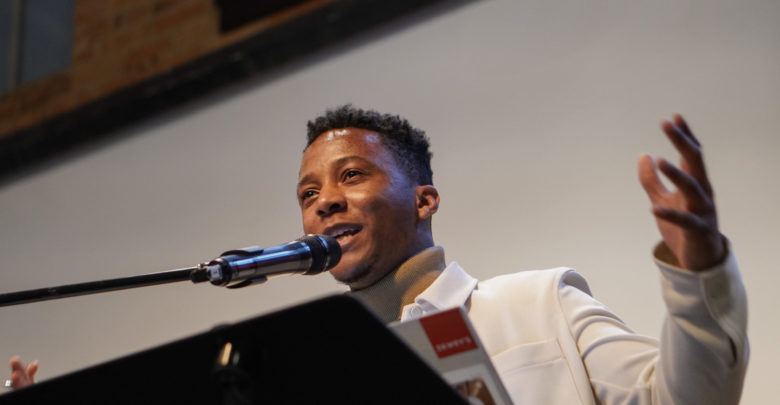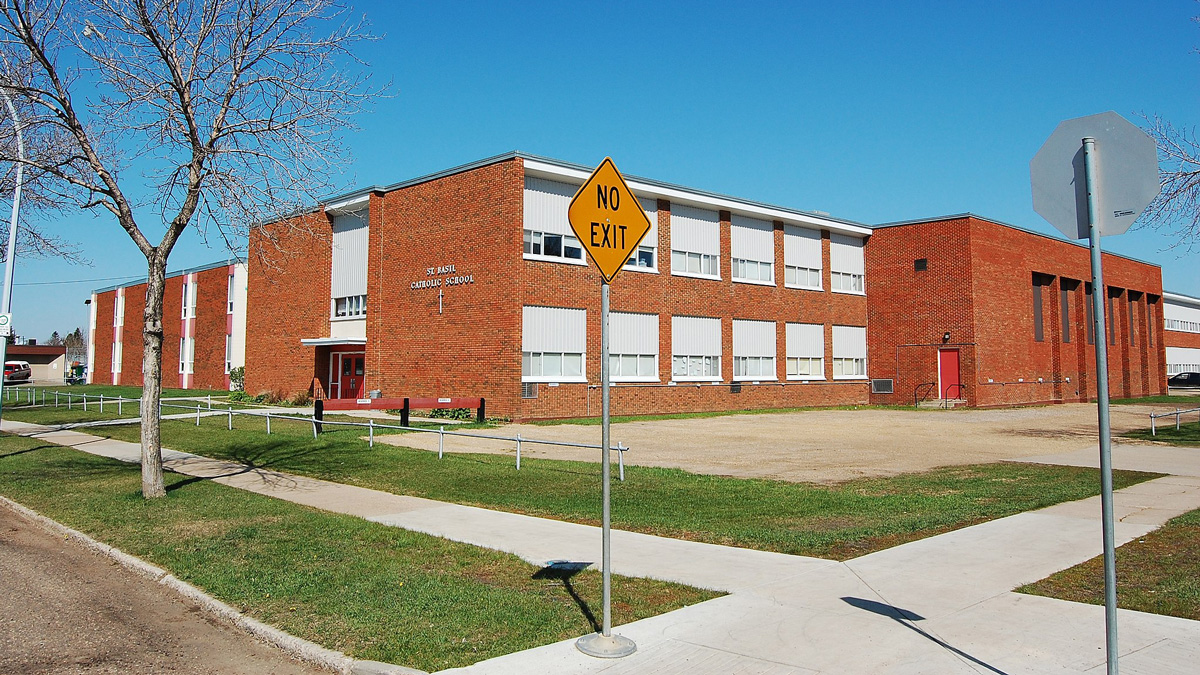SU Exec Report Cards 2023-24: President
Fotang excelled in prioritizing students' needs, especially when it came to accessibility. A big focus of his term was ensuring conversations got started, but this meant a few of his initiatives came too little too late, lowering the success of his term.
 Jonas Smith
Jonas Smith Each year, The Gateway publishes an evaluation of the Students’ Union Executive and the Board of Governors representative. It’s impossible to discuss every aspect of their tenures, so these reports are largely based on the major components of the platform each executive campaigned on, and the most significant responsibilities of their respective positions.
And if you’re short for time, check out our TLDR for a bite-sized breakdown.
Christian Fotang: A-
The University of Alberta Students’ Union (UASU) president is the figurehead of the UASU, and is responsible for the executive team. They also are responsible for advocating for students in other governing bodies, like the General Faculties Council (GFC) and the Board of Governors (BoG).
Addressing the affordability crisis, but not soon enough
Student affordability is an increasingly important topic, only amplified by the cost-of-living crisis, housing crisis, high-cost of groceries, and exceptional tuition increases. It’s what matters most to students, meaning it should matter most to SU executives in their advocacy.
When I asked Fotang what he’s most proud of achieving as president, he said prioritizing affordability throughout his term. His advocacy clearly reflects this — when we spoke in September, he was working with VP (operations and finance) Levi Flaman and VP (student life) Michael Griffiths to increase financial support and bursaries for students. Even within the early months of his term, Fotang was able to secure an additional $1 million in bursary spending for 2023-24. This was a result of “forcing the university to recognize cost-of-living has gone up,” he told me in our interview.
To be an effective president, you have to be direct in your advocacy, while also supporting the other executives in their own advocacy efforts. In previous years, former presidents have shown this is a hard line to walk. While also letting the executives have their own projects, the SU president has to know when to spear-head initiatives.
Fotang did well in this regard, particularly when it came to affordability. Later in his term, he worked with Flaman on creating student discount opportunities, and Vice-president (academic) Pedro Almeida on textbook affordability. He also worked with Vice-president (external) (VPX) Chris Beasley in advocating to the government for university funding. Fotang recognized in our interview that tuition is “ultimately the root cause of this affordability crisis” for students.
Fotang successfully ensured that each executive tackled affordability in a way that fit in their portfolio, meaning that SU advocacy was well-rounded across the board. This hasn’t always been the case for the SU — usually, some of the executives perform better than others, leaving gaps in advocacy that disproportionately affect students in specific areas. Fotang knew that affordability would be a hot topic this year, and he did the work to ensure each of his executives did what they could to support students.
But, with such a heightened focus on affordability, I was concerned that other issues would fall to the wayside, especially when it came to advocating for historically-overlooked groups on campus. Specifically, I worried that international students were going to be left behind — a recurring issue when it comes to advocacy. A lot of times, advocacy concerning post-secondary education focuses on domestic students, leaving international students to largely fend for themselves. However, by our January interview, Fotang was working to address this as well.
Fotang was raising concerns about the 7.99 per cent off-set needed to support international students. If raised to 8.99 per cent, he said this would work out to $1.2 million in financial aid to support international students. While this is likely work that will be handed off to his successor, the necessary conversations have been started.
But, this year has marked a lot of changes for international students, many of which will negatively impact them going forward. Approaching quickly, the most concerning issue is the limit on off-campus working hours, which the Government of Canada temporarily lifted in 2022, allowing international students to work unlimited hours off-campus. There are concerns that the limit will revert back to 20 hours after April 30, 2024. As well, the federal government announced in January that the cost-of-living requirement for international students would be raised from $10,000 to $20,635. International students need support, and they need it now. Although the work has been started, it likely won’t be completed soon enough.
While Fotang took the necessary steps to start conversations, more can always be done in terms of concrete, tangible action. He’s put in the work to build trust with the student body, which allowed him to get a good grade. But, I would have liked to see more solutions presented to bump him further up in the A-range.
Creating an accessible campus that fits student needs
The U of A campus is made up of roughly 45,000 students, making it the size of a small city. University administration doesn’t often consider the different opinions and concerns that make their way onto our campus. The result is that students often feel unheard or ignored when it comes to university policy.
In an ideal world, this is where the SU comes in — while students can’t always make their voices heard, the SU executive is meant to do the heavy-lifting and ensure we’re listened to. Fotang showed that this was not only a priority, but also an area he excelled in, and nothing made that clearer than the Clean Air Strategy proposal.
In October, GFC was asked to consider supporting a smoking ban which would apply across North Campus. To smoke, students would have to leave campus, which is hard to do when the university is spread over 230 acres of land. But, students were further worried about the impacts this strategy could have on Indigenous students, primarily that it could potentially prohibit traditional ceremonies like smudging. Fotang also mentioned that there was concerns that Indigenous students would be “disproportionately targeted.”
As SU president, Fotang sits on GFC, alongside Almeida, Griffiths, and the Board of Governors Representative Stephen Raitz. Together, they worked to amplify students’ concerns, and advocate for Indigenous students. Fotang said he engaged with student groups including the Indigenous Students’ Union (ISU), as well as faculty associations, during the consultation process.
In times like these, students rely on their student representatives to successfully advocate against harmful policies. Ultimately, the proposal failed at GFC. Fotang’s strong efforts toward amplifying Indigenous voices and student concerns contributed to his grade. By listening to students’ voices, Fotang showed where his priorities lie, and I’m satisfied to say that it’s with the student body.
Another way Fotang said he worked to ensure accessibility on campus is by advocating for the use of preferred names within university interfaces. Advocacy and discussions revolving around dead-name use on things like convocation booklets continued as Fotang transitioned from VPX to his role as president. The 2023 spring convocation marked the first time that preferred names were used on the reader card and program. Fotang built off of this momentum and continued to push for further advocacy in this area.
Now, students can request that their preferred name be shown on BearTracks and in convocation documents, he told me. Accommodating preferred names when possible is so important, especially when it comes to convocation. Students put a lot of time and money into attending university — it’s a shame that their identity isn’t always reflected upon graduation.
Another facet of accessibility on campus involves learning and exam accommodations, which has been a recurring focus point for past SU presidents. For Fotang, he focused on religious accommodations, a previously under-advocated area. Religious accommodations are quite common, but current university policy is vague and doesn’t always account for non-Western religions. In our interview, Fotang described that under current policy, a student has to let the faculty know of their required accommodations within the first two weeks of each semester. It’s a “flawed system that doesn’t recognize non-western or non-Christian religions,” he said.
Fotang said he’s been working with the university and Almeida to pressure change in accommodation policies to work better for students. Even if change doesn’t happen at the end of this year’s governance cycle, this is a much-needed discussion.
Pushing accessibility initiatives to the university is always hard — there’s little funding to spare, and the university is typically unwilling to make big changes. This process is only made more difficult when these concerns haven’t been focused much on before, which is the case for religious accommodations. I commend Fotang for not only considering historic gaps in advocacy, but then doing the heavy-lifting to make sure those conversations are started before he leaves.
Working to enhance SU accountability
As a part of our tuition fees, undergraduate students pay fees to the SU that partly go toward supporting executives in their advocacy efforts. As a result, financial transparency and accountability to students are really important. Increasing accountability was an important platform point for Fotang, with efforts listed to communicate more clearly and reconnect students to the SU.
In our interview, Fotang said that he was really proud of the engagement and communication the SU executives had with students throughout his term. Through tabling sessions and spending less time in the office, Fotang provided more accessible ways of voicing concerns. As well, he told me that he had a “very good open-door policy,” and would promptly reply to emails. Importantly, Fotang didn’t shy away from constructive criticism — he faced it head-on.
A big critique of the 2023 SU election was the lack of gender-diversity in candidates. Fotang told me in our interview that he was working on initiatives to get more gender-diverse people to run in the 2024 SU election. Initiatives included encouraging people to participate in Stride Campaign School, which provides marginalized people with the support to run for an executive position.
As well, Fotang told me he’s prioritized making personal connections with students, in-turn personally encouraging them to run. This year, five candidates in the 2024 SU election are women, which is infinitely better compared to the zero from last year. In every race, there’s also a ‘wild-card’ candidate — someone who didn’t previously serve on Students’ Council or as an executive. It’s unclear if this can be entirely credited to Fotang, but the results are still positive. In response to student criticism, he made the necessary efforts, and regardless of who to credit, student governance has benefited from it.
Backing-away from criticism is often easier, especially when students are passionate and angry. When the SU was faced with criticism in regards to their position on the violence in Israel and Palestine, Fotang addressed it.
The SU’s statement did not take sides, in contrast to the statement put out on the violence in Russia and Ukraine, which sided with Ukraine. I can understand the frustration on both sides, and so did Fotang. But, he prioritized the safety, mental-health, and well-being of students in his response. He also didn’t back down, in spite of criticism.
Fotang said his goal was to avoid alienating any part of the student body. In our interview, he explained how he enlisted sources to help him educate himself, and tried to provide support for everyone affected. He also said that he met with Israeli, Jewish, Muslim, and Palestinian student leaders to hear their concerns. While he could’ve doubled down or released a second statement, Fotang took his cue and decided to just let students do the talking, all while maintaining transparency and grace. Regardless of how you feel about the SU’s statement, this shows that Fotang understands the needs of his student body.
His response to criticism showed his strength as a leader — he supported his team while still trying to listen to students, which is no easy line to walk. Even now, after months of criticism, the SU hasn’t wavered in its stance.
Throughout his term, Fotang has shown that above all else, he is a strong and effective leader, both to students and his team. He knows where to improve advocacy efforts, when to speak out, and when to sit down. While some improvements could always be made, Fotang went out of his way to learn from his and his predecessors’ mistakes, ultimately leading to a really strong term as president.
TLDR: Overall, Fotang was a really strong president for this year’s UASU. His efforts to address affordability, amplify student voices, and navigate student criticism earned him an A-. I would have liked to see more initiatives throughout the year, especially to address affordability issues, but the projects Fotang did take on were rather large and he has been limited by time constraints. When Fotang wasn’t able to take on an initiative himself, he helped his VPs take on the initiatives instead, and this support is what got him the grade he did.
A-range: This person has fulfilled the promises they campaigned on and more, has created tangible change during their tenure, and has shown a commitment to improving the lives of students. Their GPA is top tier.
B-range: This person has done their job consistently well, but has not made any remarkable changes, or has fallen short on important goals they set out in their platforms. They’re doing fine, but it’s nothing to phone home about.
C-range: This person has done their job sufficiently, but has failed to make significant progress in the areas most relevant to their portfolio, or has essentially abandoned a major part of their platform. They’re still passing with a safe buffer though, and Cs get degrees!
D-range: This person has done a very lacklustre job, and has not sufficiently fulfilled their campaign promises or the responsibilities of their position.
F-range: This person has not done their job, has not represented students, and has not fulfilled their campaign promises whatsoever.




